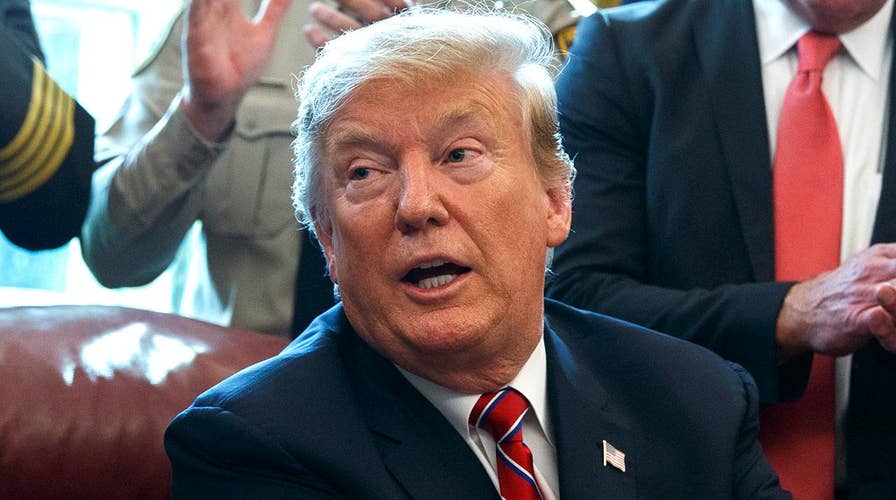President Trump attacks critics on social media
Trump had a particularly active weekend on Twitter, firing off 29 original tweets; chief White House correspondent John Roberts reports.
Former Vice President Dick Cheney pressed current Vice President Mike Pence last week during a closed-door event at the American Enterprise Institute’s Annual World Forum, about on the Trump administration’s lack of clear foreign policy.
Cheney charged that the administration’s foreign policy is largely dictated by the president’s personal Twitter, usually without the necessary consultation from senior staff.
Despite often opposing Vice President Cheney, I largely agree with him that the Trump administration’s foreign policy lacks direction and discipline.
SECRETARY OF STATE POMPEO TALKS US RELATIONS WITH ISRAEL, NORTH KOREA, CHINA AND MORE
In my newly released book, “Collapse,” I discuss the unclear direction of America’s foreign policy under the Trump administration. Indeed, it has become clear to me that President Trump lacks both a concrete strategy as well as a general direction for conducting foreign policy.
Despite the fact that the Trump administration has released a 60-page National Security Strategy (NSS), which on its surface represents the most aggressive foreign policy plan since that of President Ronald Reagan, President Trump has failed to deliver on its core tenants, specifically with regard to spreading democracy globally.
I remain concerned that President Trump’s nationalistic, isolationist “America First” approach to foreign policy projects an image of the United States as abdicating our role on the world stage as democracy’s standard-bearer.
As someone who believes that the United States is strongest when we prioritize leadership and morality in the international community, I would be pained to see the best parts of America’s internationalist legacy fall by the wayside under the weight of new isolationism.
This is a concern I have harbored since President Trump was first elected, and is one I continue to hold as I watch the president make repeated foreign policy decisions that upend decades of nation-building and relationships around the globe.
However, while I do not support President Trump’s isolationism, I am also not an advocate for the indiscriminating internationalism that was, in dissimilar ways, the fall of both President George W. Bush’s and President Barack Obama’s foreign policy.
Even when the Trump administration is setting forth coherent policy, and the president’s top-notch aides are pursuing a strategic vision that makes sense, they are susceptible, daily, to sabotage from their commander in chief, via Twitter or his own public statements. In the Trump presidency, every day is unpredictable.
When President Trump first assumed office, I was put slightly at ease by the fact that his national security staff was comprised of mostly career professionals who recognized the importance of the international framework, and understood America’s role on the global stage.
Unfortunately, many of the more reasoned voices on the president’s national security team have left their posts. It was particularly disquieting to witness the departure of former Secretary of Defense Jim Mattis, who parted with the president over “irreconcilable differences.”
“We must do everything possible to advance an international order that is most conducive to our security, prosperity and values, and we are strengthened in this effort by the solidarity of our alliances,” Secretary Mattis wrote in his resignation letter to the president. “Because you have the right to have a Secretary of Defense whose views are better aligned with yours on these and other subjects, I believe it is right for me to step down from my position.”
While I may not have wholeheartedly agreed with Secretary Mattis on everything, we share an understanding of the role that the United States should play on the world stage: the role of a global leader who champions democracy and stands up for our allies.
Regrettably, the president’s isolationist, yet also sporadic, style of conducting foreign policy signals that he does not hold the same world view.
Indeed, even when the Trump administration is setting forth coherent policy, and the president’s top-notch aides are pursuing a strategic vision that makes sense, they are susceptible, daily, to sabotage from their commander in chief, via Twitter or his own public statements. In the Trump presidency, every day is unpredictable.
For Pax Americana to succeed and for threats from authoritarian regimes such as China, Russia, North Korea, and Iran to be quelled, it is critical that the United States reestablish our role as a global leader.
There is a desperate need for a cohesive foreign policy approach that will be able to span multiple administrations, and that is focused on asserting American exceptionalism and leadership on the world stage while also supporting our allies.
The Trump administration’s NSS was a start but is effectively void given the president’s continuous unguided behavior.
CLICK HERE TO GET THE FOX NEWS APP
Lately, President Trump’s lack of foreign policy direction has been particularly troubling. Notably, his decision to withdraw troops from Syria while on a phone call with President Recep Tayyip Erdoğan of Turkey, without first consulting top national security officials, is indicative of the type of unpredictable foreign policy that has defined this presidency.
For America to truly succeed, we must renew our commitment to global leadership in a way that is informed by an idealistic, moral, yet also practical outlook toward the international community.

